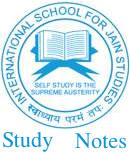
Jain Radiance On The Western Horizon
[02] Mr. Virchand Gandhi's Role
The reporter of his first words introduces him as “a lawyer of Bombay and one of the chief exponents of Jain religion”. Mr. Gandhi said: “I come from India, the mother of religions. I represent Jainism, a faith older then Buddhism, similar to it in ethics, but different from it in its psychology and professed by 1,500,000 of India’s most peaceful and law-abiding citizens”. He added that at this point he only wanted to offer thanks on behalf of this community and Muni Atma Ram Ji, whom he especially represents. This kind of meeting “has been the dream of Atma Ram Ji’s life”. He is commissioned of that grand idea, of convening a Parliament of Religions. Again in his main speech Mr. Gandhi reiterates that he speaks “simply as the mouthpiece of muni Atmaramji, the learned high priest of the Jain community in India.” (Of course the muni himself was not able to travel except on foot). He then gave a short no-non-sense, highly condensed and technical account of the ethnics and history of the Jains, their books teachings and practices. Another by him was to refute a speaker who had “cast reflections upon the chastity of the women who serve in the temples of India.” He said that he did not want “to allow free scope to an un-Christian spirit which seemed to interpose from time to time.” “I am glad that no one has dared to attack the religion I represent. It is as well they should not. But every attack has been directed to the abuses existing in our society. These abuses are not from religion but in spite of religion.”
He then spoke of westerners who went to India to convert, when they failed “they return to pass a whole life in abusing the Hindu”. He then easily showed that the charge about immoral priestesses was nonsense. He recalls how to Greek historian stated “No Hindu was ever known to tell an untruth, no Hindu women to be unchaste”. He refers to the refusal of the Hindu to criticize the character of Jesus. Similarly Akbar refused to do to the Bible what the Portuguese had done to the Quran. We may note Mr. Gandhi’s use of the word “Hindu” in these speeches. He uses it in its generic and geographical sense as a person who follows a certain type of culture and originates in certain area. He includes himself in this generic sense and it would almost seem Akbar as well, though that may be forcing the meaning. At the same time he insists his own religion is Jainism and it has not been attacked by the remarks on Hindu temple practice. It is important to note that Mr. Gandhi, who is not a monk, represents Jainism but points out that he stands there on behalf of his muni and his community. Mr. Gandhi’s closeness of thought to his muni can be traced in considerable detail in a book of questions and answers prepared by Mahamuni Shrimat Vijanandsuri - the official name of Muni Atmaramji - for use at the parliament.[3] It is a most valuable compendium of Jain doctrine of that day and age in logical and clear terms, refusing to believe in a creator God but accepting the working of powers in the Universe somewhat like the laws of science as interpreted in keeping with the idea of relativity.
 Dr. Surendra Singhvi
Dr. Surendra Singhvi